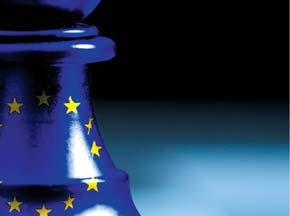
13 minute read
How Joe Biden Will Aff ect European Business
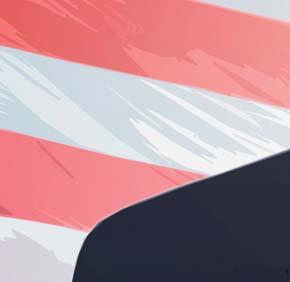

Advertisement

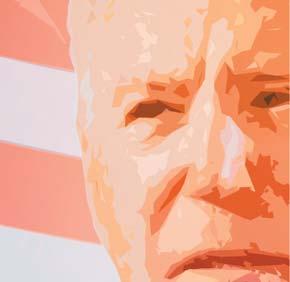

How Joe Biden will aff ectEuropean Business
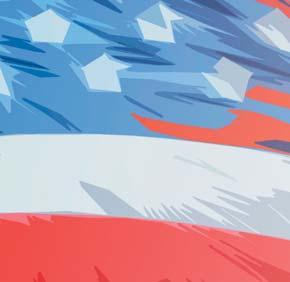



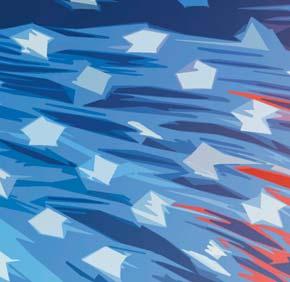

Now that the presiden al race is all but over following the electoral college predictions in favour of now President-Elect Joe Biden, thoughts turn to how his role as number 46 will change the way America operates over the next four years. While Donald Trump made many efforts to change the landscape, his most pivotal ini a ve was to s mulate and revitalise the economy which, he claims is the most successful it has ever been despite the authoritarian and self-interest regime which moved away from the EU, seeing them as a foe not friend. Biden’s rela onship with European business, while strained is expected to provide a much diff erent outlook. Many European leaders in fact feared that Trump would a second term and were vocally suppor ve of Joe Biden due to the percep on that under the current president the Trans-Atlan c rela onship was star ng to fade, while Biden as a lifelong Trans-Atlantic advocate already shares some strong links to various key figures across the con nent such as German chancellor Angela Merkel, and therefore is considered to be possibly the best thing aside from an actual European in the white house. This presence means that in terms of being able to nego ate and do deals, there will be a mindset shi from the current hos lity into something that is respec ul and will allow for a perfect environment to repair, renew and redefi ne the business rela onship and specifi cally the Trans-Atlan c agreement for years to come, provided that Europe actually want this to happen. When you consider the state of the global economy where the world is crushed by the constant fear due to the current coronavirus pandemic, the subsequent environmental destruc on and the fact that Donald Trump has almost single-handedly encouraged the reinvigora on of authoritarianism, there is no doubt that in order to preserve their future then they will have no choice but to work with any new American government.



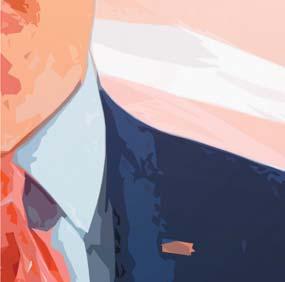
The current situa on around trade will take much nego a on, mainly thanks to the way Trump treated the EU like an enemy and instead formulated plans and strategy around ideas at great opposi on to the current agreements, mostly through his stance of building stronger and more dangerous rela onships with combative nations such as China, North Korea and Russia while seeking to increase tariff s on EU imports such as metals and wines. The Biden administration also can’t directly change this overnight either. Due to the republican party a acks on free trade agreements, the party would be at threat of losing support should they directly realign themselves with a con nent that also has a widening and outstanding trade defi cit of over $170 million. He however, will be expected to over time reengage with the agreement especially with the openness that many EU leaders will need to have, a fact made a lot easier by the President-Elect already having committed to returning to the Paris Climate Agreement through execu ve ac on immediately following his inaugura on on January 20th . The US also has a great need for this relationship with their agreement with China slowly degrading even under Trump, especially considering they slowly become more of a threat to the na on which causes further losses in the business relationship. An added complica on is that China actually also has strong ties within Europe, where Germany is a key partner to the Asian na on and therefore specifi cally German companies will be more apprehensive of conduc ng further business with America due to the poli cal landscape possibly causing suppliers to refuse to work with companies who do show loyalty to their home na on. This is more significant as the American influence could cause further economic losses for China in countries such as Germany where they look to force Huawei and their 5g technology to be banned under suspicions that they are a secret vehicle for Chinese intelligence gathering. While s ll considered part of Europe geographically, the impending Brexit ini a ve means that the UK will only further suffer with the new president, with Biden’s Irish roots meaning that he could look to use Ireland as the bridge building nation rather than the traditional English route, which puts great risk of damage into the special UK-US rela onship. Pressure is being heavily placed on Boris Johnson to provide a viable mutual solu on to the ongoing exit talks, as exis ng tensions stemming from Johnson’s close rela onship to Trump and his rude language when talking about democrats such as former president Barack Obama. This presents a situa on where in 2021, the trade talks will be heavily skewed towards working with the EU in a me of great Bri sh need to strike individual deals, unless Johnson can impress and show support for Biden and his plans in order to build the kind of rapport needed. The sheer volume of companies who operate on both sides of the Atlan c makes this a crucial part of the decisions taken to ensure that the economic outlook can remain posi ve. Despite all this positivity in regard to moving forward in prosperity with EU and creating a positive business environment, Biden faces many issues that must be fi xed in order to proceed. Most of all, the tariff s and trades must be li ed from the previous administra on and he must navigate an agreement on the current $4bn that the continent is threatening to levy over fake subsidies believed to have been used on the aerospace industry for Boeing and Airbus. The damage from this is that for some smaller corporations, the supply chain will prove too expensive to profi t from US goods and no longer be able to benefi t from any current or prospec ve partnerships. There is also a growing cultural divide from some of the member states with may provide some hos lity to Biden, with Trump’s message not only resona ng with his own American people but his forceful personality also inspired the many an -establishment par es who due to legisla on such as free movement and the fi nancial crisis, have found promise in a more self-focused a tude. Countries like Poland are ac vely despondent at the loss of such a booming presence that helped their own causes, and so see less merit in engaging with Joe Biden. Following in the footsteps of Donald Trump, Joe Biden is the kind of leader Europe and its business communi es need to prosper once again from their previous and current relationships. While there may exist las ng hos li es and there be a las ng me period before it is reinstated, countries like Germany and France suff ered under Trump and so will look forward to the ability to regain a vital ally, especially in a worldwide pandemic where this support for their economies will be so important.


Why the U.S needs EU Business now more than ever

The rela onship between the EU and America has existed since the birth of the na on over two hundred and forty years ago. However, since his inaugura on as the 45th President of the United States, Donald J. Trump has taken every measure possible in order to devalue and ultimately damage the lasting rela onship. In his personal opinion, he has been quoted to see more of a foe than a friend in his European counterparts, focusing on a policy of isola onism and individualism in a feeble a empt to establish American superiority again, which has caused much more harm than good, especially in terms of the business agreements he has tarnished. Despite this, now that he has all but been replaced by President-Elect Joe Biden, there is a need for him to re-stabilise the country and bring back prosperity. To do this, EU business is crucial to future prospects. Especially when considering the current pandemic and its eff ects worldwide, America like all other na ons is struggling to maintain the economic standards expected- a fact considered to be a result of the ignorance and failure of the outgoing president to react or protect it, despite it being his main focus and the issue with which he believed would secure him his re-elec on. Such attitudes have overlooked one of the crucial ways in which the na on has s ll managed to survive, which is through Foreign Direct Investment, also known as FDI. This monetary contribu on is the investment shared between countries and is key to the maintenance of current stability, as the US and EU are in fact each other’s primary des na on for FDI with it making up 2.1% of American gross domes c product. State based affiliates of companies from the 27 EU member states is responsible for hundreds of billions of the imported and exported goods produced, with this figure not including the further billions spend in research and development while overall employing over 3 million US na onal workers where the average wage is o en higher than the American standard. The con nua on of this infl ux and co-opera on is of desperate need to keep the country afl oat, with its corporations such as German auto giant BMW being a significant part of previous economic crisis with their $1bn investment in a new South Carolina based produc on plant at a me when compensa on packages were necessary during President Obama’s administra on to save the ailing Automo ve industry. The need for EU business is also very much from a political standpoint. Donald Trump’s policies meant that under his direc on the United States ended its involvement in major worldwide co-opera on projects such as the World Health Organisa on and the Paris climate agreement, which are vital to ensure the country has the ability to infl uence the direc on of world health and climate change. America has such an important role in major developments that countries have complained, and the staff list is largely made up of American born ci zens such as the world’s leading coronavirus expert, who would be forced to resign due to the only way to have employment is for your own country to be part of the agreement. In such moves to be more autonomous and create an almost dictatorial role for himself, Trump has taken the country away from the European con nent to align himself more with the enemy states such as Russia, China and North Korea who also avoid co-opera on. Biden now needs the EU interests to encourage or even force support so that he can consolidate both the country’s and his own posi ons to ensure there is the ability to re-join or prevent the exit from the agreements so that he can keep them as a world power. This is more important s ll when considering that without access to the top Coronavirus knowledge, there is an increased threat to American health which also impacts the opera ons of the organisa ons and their employees within the country who will be less inclined to continue existing deals, especially if there was no joint interna onal alliance to help end the pandemic. These companies are also why such countries as France, who no longer see the US as a viable partner







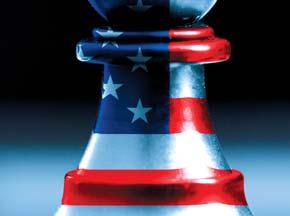

anymore due to the previous administration’s tactics, continue to engage and therefore contribute to the na onal economy. A vital part of the need also comes down to protection and security, as the trade deals func on to provide supply and demand for weapons, people and even nuclear deterrents as strategic base placement from the US on European soil is down to the economic and fi nancial es that allow America to have such an expansive presence throughout the world stage. This alongside the long-standing shared ideology and interests shows a clear need for a united front, more vital in the coming months as with the country weakened and Joe Biden moving away from the more vola le na ons, there is a much bigger threat of a poten al show of strength in defi ance of the new regime change and what will surely cause economic and control losses with the exit of Trump. America now exists in a state of need- weakened by poor leadership and by the pandemic, it needs to put the past behind and move to prosper again from its supply chains. The economy could not survive without the con nued and developing existence of its automotive, manufacturing and oil industries, all of which are propped up by the business rela onship from the EU and the investment they provide into the na on. Biden is in a posi on where he needs to legitimise America again to its friends and neighbours, where it condemns rather than supports the world’s most dangerous regimes which threaten its allies and can ensure the support to remain in its position as the ‘leader of the free world’. European trade and investment has been the backbone of business and poli cs across the lifespan of the na on, and at a me when the next four years could be the most crucial in its existence, America needs to restore this as a key part of it ongoing interna onal and domes c policy.











